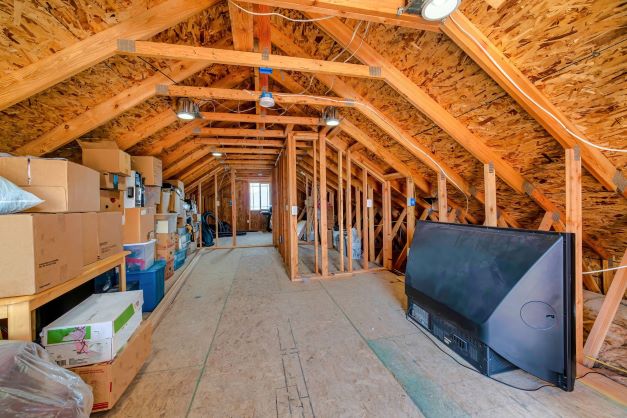
Many American families have an accumulation of stuff in their homes: gasoline cans, spare oil, half-containers of antifreeze, fertilizer, yard pesticides and other materials all compressed together into one poorly ventilated space. This creates the perfect conditions for vapors, chemical reactions and combustibles like cardboard boxes to accumulate, heat up and ignite.
As you think about the storage areas around your house, remember these home safety tips.
Your basement
Do not keep flammables (mineral spirits, paint thinners, etc.) in your basement. Vapors can easily reach the gas pilot light on your furnace or water heater, or a spark on your electrical panel or fuse box.
Check radon levels. Radon is a radioactive gas that can enter your home through cracks or gaps. According to the Centers for Disease Control and Prevention, radon exposure is a leading cause of lung cancer, second only to smoking.
Keep a fire extinguisher and smoke detector in your basement. While a residential fire extinguisher and smoke detector may not save your house in the event of a fire, they can save your life. Make sure to install your smoke detector in a ceiling area and your fire extinguisher where it’s easily accessible.
Check railings and keep stairs clutter-free. When you’re moving items up and down stairs, you need your stairs to be unobstructed and stable. You can also minimize your risk of injury by splitting loads into smaller boxes. It may not be as convenient, but it can save you from a nasty injury.
Install ample lighting. Keep your basement well-lit and ensure light switches are accessible from the point of entry.
Your attic
Reserve your attic for lighter items. Usually, attic stairs are more narrow and less sturdy, and the ceiling hole is often only wide enough to fit your body.
Maybe there is a better spot for your 100 pound Christmas tree?
Stay on the rafters when doing attic work. If you are adding insulation or hooking up an exhaust vent, stay on the rafters, not the floor — or you could end up falling through.
In college, I had a roommate that decided he was qualified to run the wiring for a surround sound system. Much to the surprise of my other roommate and I, he slipped between two rafters and fell through the drywall ceiling, right onto the entertainment center! Luckily for him, he was uninjured.
Your storage shed
Don’t mix incompatible materials. Mowers, plastic gas cans, fertilizers, insecticides and aerosols all stored together is a recipe for disaster, especially if the windows and door are kept closed.
Your storm shelter
Your storm shelter is not a good place to store items, either. Especially in spring, when you may need to get in your shelter with no time to spare. Keeping that area clean and supplied with water, towels, and other emergency supplies is a whole different topic. Don’t clutter up your safe spot with boxes of crap.
A few more tips
Whether you’re using a basement, attic or shed, keep your storage area well-ventilated. If you live in an older home, you likely don’t have any air-tight spaces. But you should still keep air flowing around shelving, cabinets and enclosed rooms to minimize the risk of vapors or radon. If you live in a newer home, maintain airflow to keep heat, radon, moisture, mold and vapors at safe levels.
Finally, use common sense when storing things and buy only what you need.
Your home can harbor many hazards, but following these simple storage tips can help keep you and your family safe.
Hopefully, by following these tips, you will never have to use your homeowners insurance after a loss by fire from poor storage practices.
